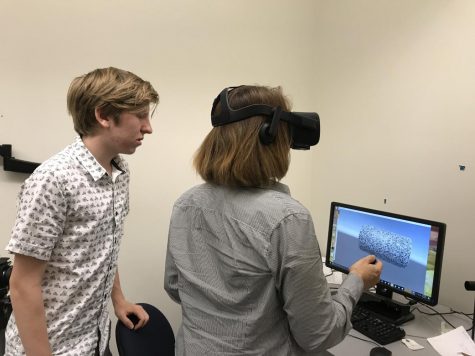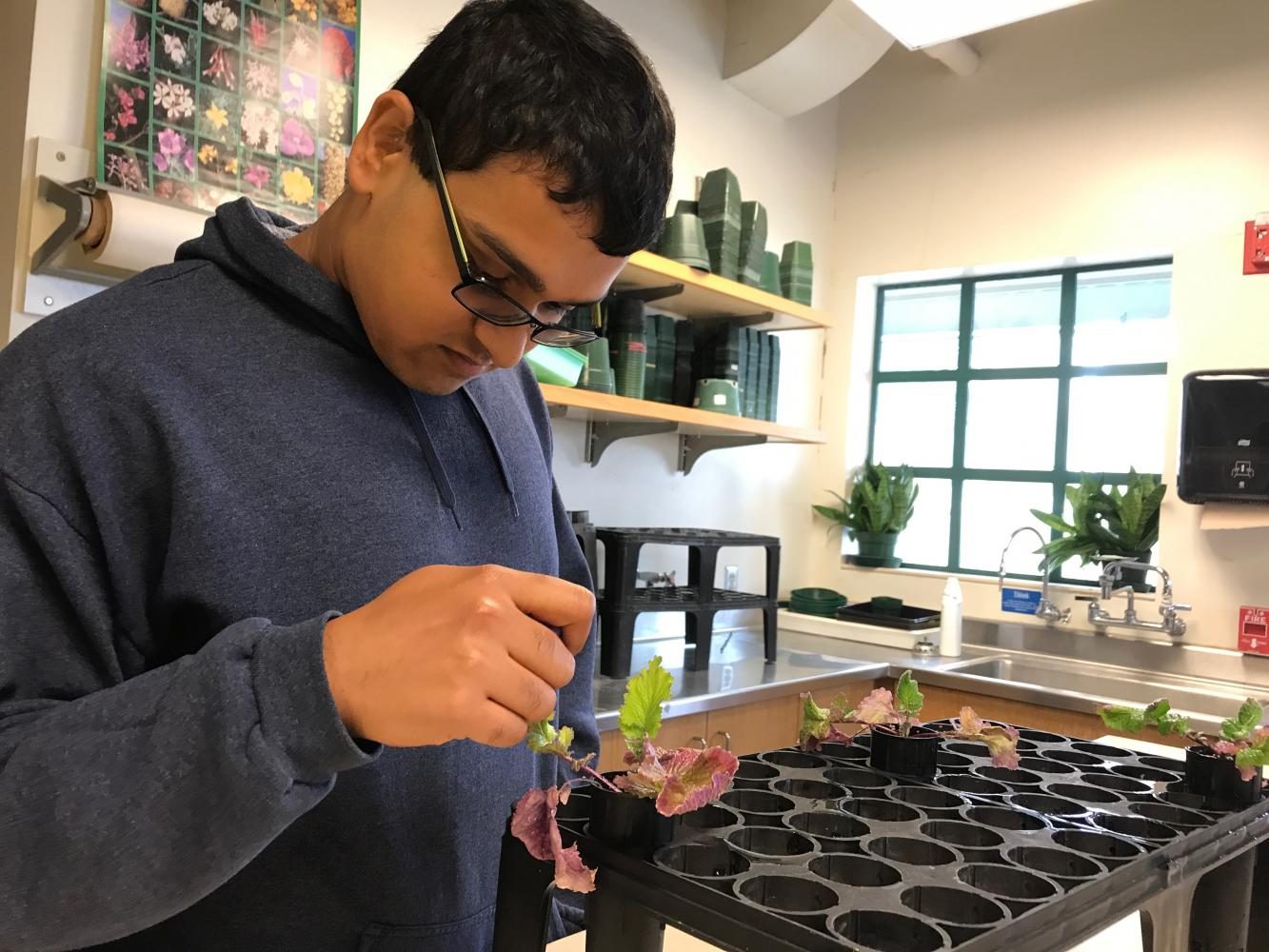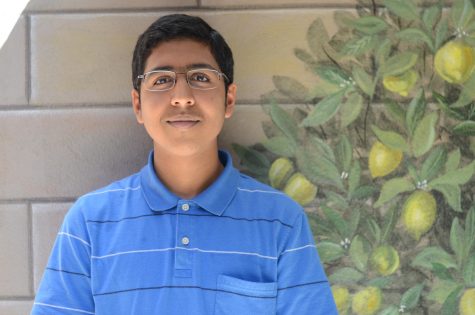Summer research brings new opportunities
Arindam Ghosh (12) conducts daily lab work at his laboratory. Students at SIP were assigned to individual and group projects.
September 8, 2017
Students partook in various research projects over the past summer, working in internship programs and participating in research.
“I worked on finding driver mutations for the alternative lengthening of telomerase pathways in cancer cells,” Rahul Bhethanabotla (12), who took part in the UC Santa Cruz Summer Internship Program (SIP), said. “I thought the research that I did was interesting. It was definitely informative, I learned a lot from it. But most of all I think it was very useful in actually helping people fight cancer.”
Some students found their summer internships through emailing professors at various labs, asking to work under their mentorship for the summer
“I emailed around… I looked up the certain area of research I was interested in [neuroscience] at local universities like San Jose State, Stanford, and UCSF,” Eric Jeong (12) said. “I had an intro explaining my past experience that I reused, but then I looked at each professor’s individual research and wrote about how each professor’s research interested me. Ultimately Stanford’s program impressed me the most, and I was happy I chose that university.”
Some students had remarkable research experiences that defied their initial expectations. Joanna Lin (12), who also participated at SIP, worked on the relationship with brassica plants and pierid butterflies and their categories.
“It definitely was a surprise for me because I’m used to being in class where our teacher preps all of our experiments and our labs,” Joanna said. “Here, we had to come up with our own protocol and experiment with it and troubleshoot it. Our reagents didn’t always work the way we wanted to, so we had to do a lot of troubleshooting, and sometimes we would spend a whole morning getting almost nothing done because of the trial and error.”

Maxwell Woehrmann (12) tests his research with his partner, senior Katherine “Kate” Chow (not pictured). Students at SIP were assigned to individual and group projects.
Junior Kelsey Wu participated in an internship at Stanford University to help create strength-based assessments for individuals with autism. She, too, had a unique opportunity through her research.
“My research experience was really rewarding,” Kelsey said. “I learned technical skills that I could have never learned in the classroom. For example, because of my interest in psychiatry and human behavior, I founded a choir for individuals with autism in 2014 and have been working with the choir ever since, which really helps on my personal interactions with the children.”
Students who participated in different research curriculums this past summer advised the students aspiring to participate in summer research.
“Whenever you are curious about a question, just ask your mentor,” Arindam Ghosh (12) said. “That will help you immensely during paper writing. There will always be errors in your experimentation, and it’s important to recognize them and not to skew your results in a way.”
Joanna’s advice to future researchers closely relates to lessons that she learned from her research experience.
“Definitely don’t get too frustrated when things don’t work out the way you want it to,” Joanna said. “There’s always ways to get results. There’s a quote by Thomas Edison that says ‘I haven’t failed. I’ve just found 1,000 other ways that won’t work.’ Just keep working on things until they work out.”
This piece was originally published in the pages of the Winged Post on September 6, 2017.


















![“[Building nerf blasters] became this outlet of creativity for me that hasn't been matched by anything else. The process [of] making a build complete to your desire is such a painstakingly difficult process, but I've had to learn from [the skills needed from] soldering to proper painting. There's so many different options for everything, if you think about it, it exists. The best part is [that] if it doesn't exist, you can build it yourself," Ishaan Parate said.](https://harkeraquila.com/wp-content/uploads/2022/08/DSC_8149-900x604.jpg)




![“When I came into high school, I was ready to be a follower. But DECA was a game changer for me. It helped me overcome my fear of public speaking, and it's played such a major role in who I've become today. To be able to successfully lead a chapter of 150 students, an officer team and be one of the upperclassmen I once really admired is something I'm [really] proud of,” Anvitha Tummala ('21) said.](https://harkeraquila.com/wp-content/uploads/2021/07/Screen-Shot-2021-07-25-at-9.50.05-AM-900x594.png)







![“I think getting up in the morning and having a sense of purpose [is exciting]. I think without a certain amount of drive, life is kind of obsolete and mundane, and I think having that every single day is what makes each day unique and kind of makes life exciting,” Neymika Jain (12) said.](https://harkeraquila.com/wp-content/uploads/2017/06/Screen-Shot-2017-06-03-at-4.54.16-PM.png)








![“My slogan is ‘slow feet, don’t eat, and I’m hungry.’ You need to run fast to get where you are–you aren't going to get those championships if you aren't fast,” Angel Cervantes (12) said. “I want to do well in school on my tests and in track and win championships for my team. I live by that, [and] I can do that anywhere: in the classroom or on the field.”](https://harkeraquila.com/wp-content/uploads/2018/06/DSC5146-900x601.jpg)
![“[Volleyball has] taught me how to fall correctly, and another thing it taught is that you don’t have to be the best at something to be good at it. If you just hit the ball in a smart way, then it still scores points and you’re good at it. You could be a background player and still make a much bigger impact on the team than you would think,” Anya Gert (’20) said.](https://harkeraquila.com/wp-content/uploads/2020/06/AnnaGert_JinTuan_HoHPhotoEdited-600x900.jpeg)

![“I'm not nearly there yet, but [my confidence has] definitely been getting better since I was pretty shy and timid coming into Harker my freshman year. I know that there's a lot of people that are really confident in what they do, and I really admire them. Everyone's so driven and that has really pushed me to kind of try to find my own place in high school and be more confident,” Alyssa Huang (’20) said.](https://harkeraquila.com/wp-content/uploads/2020/06/AlyssaHuang_EmilyChen_HoHPhoto-900x749.jpeg)







